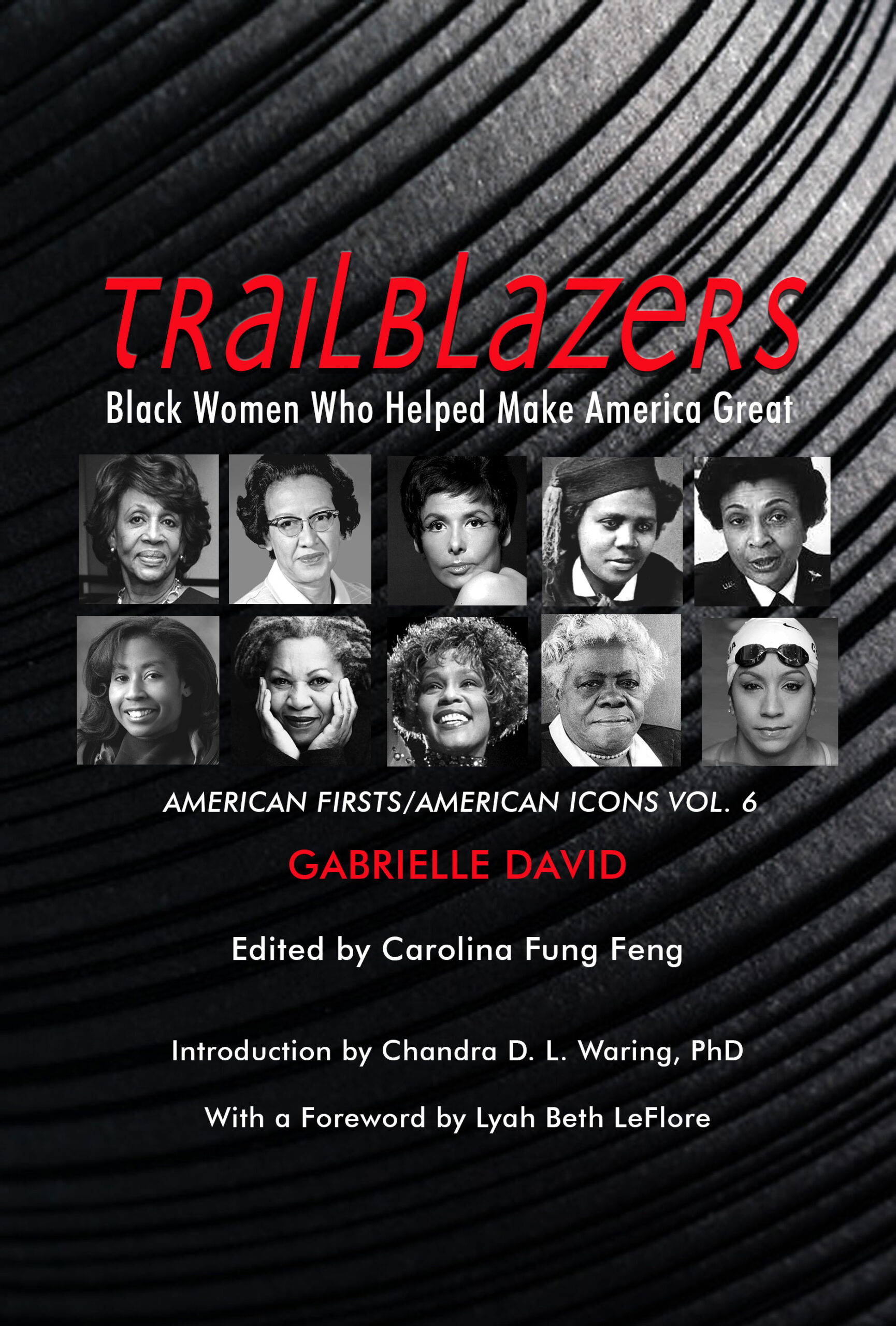TRAILBLAZERS, Black Women Who Helped Make America Great, American Firsts/Icons by Gabrielle David is a six-volume series that examines the lives and careers of over 400 brilliant women from the eighteenth century to the present who blazed uncharted paths in every conceivable way. The lives profiled here include recognizable figures alongside some women that readers will be discovering for the first time, as well as those women who are shaping the era we live in today.
Volume 6, the final volume in this series, examines Black women in theater, aviation and aerospace, law and order, and fashion. The origins of Black theater in America can be traced back to the slave trade and the continuation of African performance traditions, from minstrelsy shows and vaudeville to Broadway musicals, all before the twentieth century. Pioneers like Angelina Weld Grimké, one of the first Black women to have a play publicly performed, Vinnette Carroll, the first Black woman to direct a Broadway production, and Lorraine Hansberry, the first Black female playwright to have a play performed on Broadway, are considered by many as the “Black godmothers of theater.” It was only recently, however, when Black women began receiving long-overdue recognition with the careers of Suzan Lori-Parks, who became the first Black woman to win a Tony and Pulitzer Prize, Tony-nominated Dominique Morisseau and Danai Gurira, and two-time Pulitzer Prize winner Lynn Nottage. This new wave of Black women playwrights, producers, directors and costume directors is reinventing the genre and, quite literally, changing the face of American theater.
Despite the enthusiasm for aviation sparked by the Wright brothers’ historic flight in 1903, African Americans could not fully participate due to racial discrimination. Despite these obstacles, a handful of Black women contributed significantly to flight and space exploration. Readers will quickly discover that Bessie Coleman was not the only early Black woman aviator. Willa Beatrice Brown Chappell, Dorothy Layne McIntyre, and Mildred Hemmons Carter paved the way for Black women pilots in the Armed Services like Vivian Bailey, Marcella Hayes Ng, and Vernice Armour, including the first Black woman astronaut, Mae Jemison, and Melissa “M’Lis” Ward, the first Black female captain in commercial passenger aviation.
Black women remain underrepresented in legal and law enforcement due partly to cultural and organizational barriers. In the early twentieth century, Charlotte E. Ray was the first Black woman to become an attorney in the U.S. A handful of Black women followed, notably Constance Baker Motley, whose success as an attorney with the NAACP led her to become the first Black woman elected to the New York State Senate, the first to serve as Manhattan Borough President, and the first Black woman named a federal judge. Like their White counterparts, Black women were initially employed as social workers, matrons, and school crossing guards in police agencies. Grace Wilson in Chicago, and Georgia Ann Robinson in Los Angeles, became the first Black women to become police officers. In time, Black women have assumed positions as officers, middle managers, and chief executives, and by the twenty-first century, more than a dozen Black women have led police departments in America’s 100 largest cities. Yet, many obstacles remain as they continue to break glass ceilings in their respective careers.
The fashion industry, which has always capitalized on Black culture, has been the most resistant of industries toward African Americans. As such, this section includes Black women designers, stylists, influencers, entrepreneurs, photographers, and models. Black women have been sewing and designing clothes out of necessity since time memorial, with the first documented designer was the formerly enslaved Elizabeth Hobbs Keckley, whose main patron was Mary Todd Lincoln. But for years, American fashion’s hierarchical love of racism and classicism prevented Black women from fully engaging in the industry. Mostly, the tales of toxicity in fashion are not new. Nevertheless, it was the persistence of women like Eunice Johnson, Ophelia DeVore, Audrey Smaltz, Naomi Sims, Beverly Johnson, Bethann Hardison, and Robin Givhan that helped break barriers so that women like designer Tracey Reese, photographer Dana Scruggs, and so many others would be able to crack open doors into an industry where beauty is in the eye of its beholder.
With painstaking research, David has created an affordable, visually rich, and accessible reference book. From the foremothers who blazed trails and broke barriers, to the women who follow in their footsteps, TRAILBLAZERS offers powerful and inspiring role models for women and girls from all cultural backgrounds and for the intellectually curious. TRAILBLAZERS is a clarion call for recognition of the transformative work Black women have done and continue to do. Written in accessible prose that contains personal reflections for a broad audience, TRAILBLAZERS also serves as a vital reference guide for use in schools and libraries.













Reviews
There are no reviews yet.